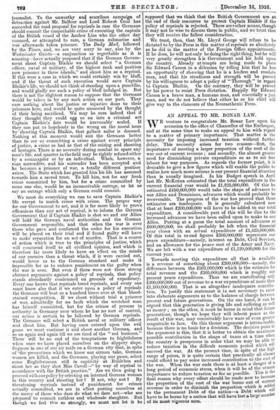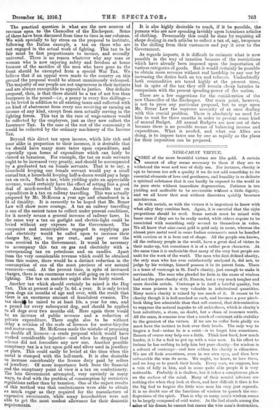AN APPEAL TO MR. BONAR LAW.
WE venture to congratulate Mr. Boner Law upon his accession to the office of Chancellor of the Exchequer, and at the same time to make an appeal to him with regard to a matter of primary importance. That matter is the necessity for imposing increased taxation without further delay. This necessity arises for two reasons—first, the importance of meeting a larger proportion of the cost of the war out of current revenue ; and secondly, the almost greater need for diminishing private expenditure so as to set free labour for war purposes. As regards the former point, it is desirable to give a few figures -which will enable the public to realize how much more serious is our present financial situation than is usually imagined. In his Budget speech in April last Mr. McKenna estimated that the total expenditure in the current financial year would be £1,825,000,000. Of this ho estimated L450,000,000 would take the shape of advances to our Allies and Dominions, advances which would probably be recoverable. The progress of the war has proved that them estimates are inadequate. It is generally calculated now that at least £200,000,000 will have to be added to our total expenditure. A considerable part of this will be due to the increased advances we have been called -upon to make to our Allies. Putting at a guess the total amount of advances at £600,000,000; we shall probably be left when the financial year closes with an actual expenditure of £1,425,000,000. Of this total in ro and figures £305;000;000 represents our peace expenditure—namely, interest on Debt, Civil Services, and an allowance for the peace cost of the Army and Navy. We are left with a war expenditure of £1,120,000,000 for the current year.
Towards meeting this expenditure all 'that is available is a revenue of something about £200,000,000—namely, the difference between the £502,000,000 which is the estimate for total revenue and the £305,000,000 which is roughly our present peace expenditure. Thus we are contributing only £200,000,000 out of revenue to a war expenditure of more than £1,100,000,000. That is an altogether inadequate contribu- tion. To justify this statement it is not necessary to enter into elaborate arguments as to the balance of charge between present and future generations. On the one hand, it can be argued 'that this generation is giving life and suffering as well as money ; on the other, it must be borne in mind that future generations, though we hope they will inherit peace as the result of this war, may conceivably have wars of even greater magnitude to face. On this theme argument is interminable, because there is no basis for a decision: The decisive point ill the argument is this, that it is better to obtain the maximum possible contribution in the shape of taxes at a time when the country is prosperous in order that we may be able to reduce taxation in the difficult economic period which will succeed the war. At the present time, in spite of the high range of prices, it is quite certain that practically all classes could afford to pay some increased contribution to the cost of the war. When the war ends there is at least a danger of a long period of economic stress, when it will be of the utmost importance to reduce taxation as far as possible. This is the final reason why every effort should be made now to moms° the proportion of the cost of the war borne out of current revenue in order to diminish the proportion which is added to the permanent Debt of the nation—a Debt which will have to be borne by a nation that will have lost a large number of its most vigorous men. The practical question is what are the new sources of revenue open. to. the Chancellor of the Exchequer. Some of these have been discussed. from time to time in our columns. We wish specially to lay stress on the proposal to institute, following the Italian example, a tax on those who are not engaged in the actual work of fighting. This tax to be fair must be first proportionate to income, and secondly universal. There is no reason whatever why any man or woman who is now enjoying safety and freedom at home because of the sacrifice of the men who have gone to the front should be exempted from a special War Tax. We believe that if an appeal were made to the country on this ground the proposal would be almost unanimously welcomed. The majority of our people are not ungenerous in their instincts and are always susceptible to appeals to justice. Our definite proposal, then, is that there should be a tax of not less than fourpence in the pound—i.e., a penny in every five shillings— to be levied in addition to all existing taxes and collected with no kind of abatement from every one receiving or earning an income of any kind, except from men actually serving in the fighting forces. This tax in the case of wage-earners would be collected by the employers, just as they now collect the Insurance 'Tax. In the case of the rest of the community it would be collected by the ordinary machinery of the Income Tax.
Beyond this direct tax upon income, which hits rich and poor alike in proportion to their incomes, it is desirable that we should have many more taxes upon expenditure, and especially upon forms pf expenditure which can fairly be classed as luxurious. For example, the tax on male servants ought to be increased very greatly, and should be accompanied by a graduated tax on female servants. That is to say, a household keeping one female servant would pay a small annual tax, a household keeping half-a-dozen would pay a large tax on each. Such a tax, while yielding quite an appreciable revenue, would certainly have the effect of setting free a good deal of much-needed labour. Another desirable tax on expenditure is a tax on railway travelling. This was actually proposed 'by Mr. McKenna a year ago and abandoned in a fit of timidity. It is earnestly to be hoped that Mr. Boner Law will show more courage. A tax on railway travelling is one of the easiest taxes to collect under present conditions, for it merely means a general increase of railway fares. In the same way a tax on gaslight and electric-light could be levied without any expense to the Government. The companies and municipalities engaged in supplying gas and electricity would be called upon to increase their charges by, say, ten per cent., and pay over the sum received, to the Government. It would be necessary to accompany this tax on gas and electricity with a corresponding tax on petroleum and on candles. Apart from the very considerable revenue which could be, obtained from this source, there would be a distinct reduction in the consumption of one of the most precious of our natural resources--coal. At the present time, in spite of increased charges, there is an enormous waste still going on in excessive lighting. The tax on matches might also be fairly raised.
Another tax which should certainly be raised is the Dog Tax. This at present is only 7s. 6d. a year. It is only levied upon dogs six months of age and over, with the result that there is an enormous amount of fraudulent evasion. The tax shoul. be- raised at least 10s. a year for one, and a pound -kr every subsequent dog, and should be applied. to all dogs over two months old. Here again there would be an increase of public revenue and a reduction of private expenditure. There ought also to be without delay a revision of the scale of licences for motor-bicycles and motor-cars. Mr. McKenna made the mistake of proposing to double all licences—a crude proposal which would have worked considerable injustice—and when he dropped that scheme did not formulate any new one. Another possible sumptuary tax is a tax upon gold and silver used in jewellery or plate. This could easily be levied at the time when the metal is stamped with the hall-mark. It is also desirable to increase considerably the licence duty paid by sellers of jewellery. Of more importance both from the financial and- the sumptuary point of view is a tax on confectionery. The late Government attempted, very unwisely in many ways, to deal with the problem of consumption by restrictive regulations rather than by taxation. One of the unjust results of this method was that confectioners were able to obtain as much sugar as they required for the manufacture of expensive sweetmeats, while many householders were not able to get the most modest allowance for their domestic requirements. It is also highly desirable to reach, if it be possible, the persons who are now spending lavishly upon luxurious articles of clothing. Presumably this could be done by requiring all shops dealing in such articles to collect a tax of, say, twopence in the shilling from their customers and pay it over to the Government.
As regards imports, it is difficult to estimate what is now possible in the way of taxation because of the restrictions which have already been imposed upon the importation of various categories of goods. But it would certainly be possible to obtain more revenue without real hardship to any one by increasing the duties both on tea and tobacco. Undoubtedly both commodities are taxed highly at the present time, but in spite of the tax they still remain cheap luxuries in comparison with the present spending-power of the nation.
These are a few suggestions for the consideration of the new Chancellor of the Exchequer. Our main point, ,however, is not to press any particular proposal, but to urge upon Mr. Boma Law the supreme necessity of at once dealing with this crucial problem. There is absolutely no need for him to wait for three months in order to present some kind of annual Budget. All annual Budgets are now out of date because there is no possible means of balancing income and expenditure. What is needed, and what our Allies are doing, is to impose taxes one by one as rapidly as- the plans for their imposition can be prepared.



































 Previous page
Previous page